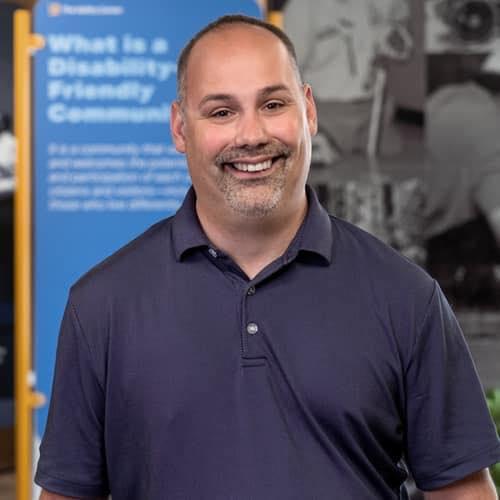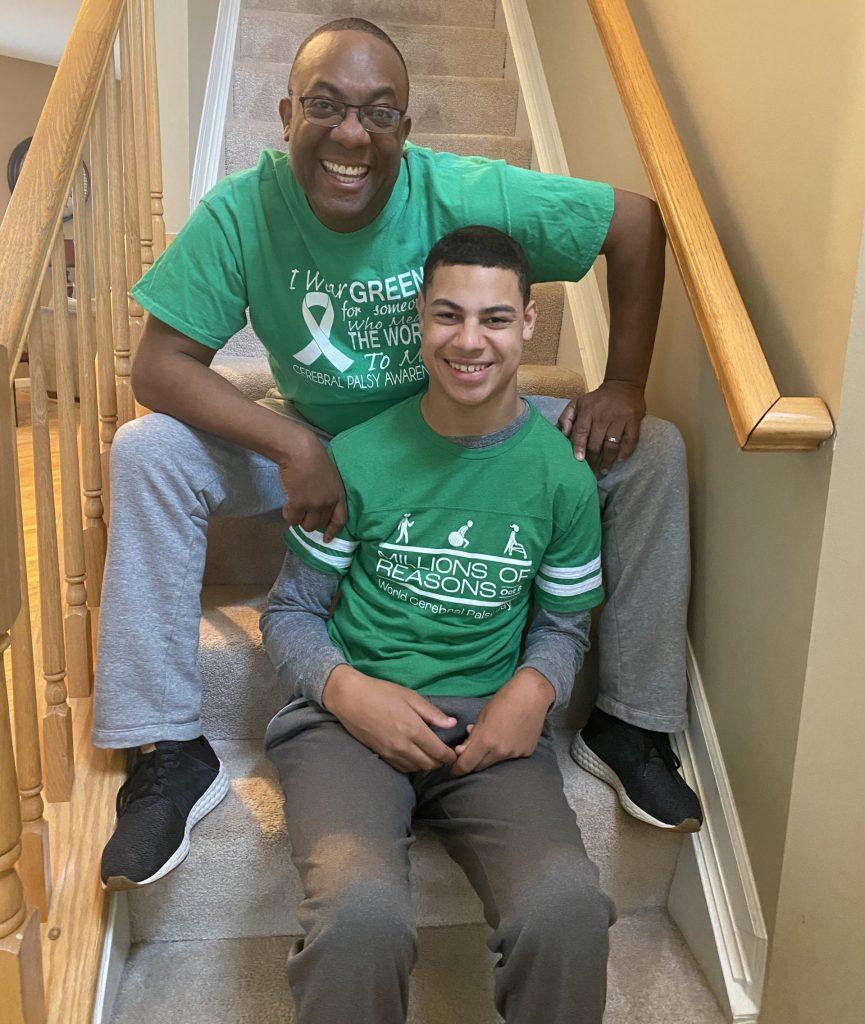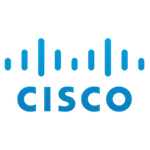Disability Pride Month: A Conversation at Cisco Around Being Able to Be Your Authentic Self at Work
By Alex Allen
July is Disability Pride Month, a time to celebrate and honor the diversity within the disability community, reflect on challenges that people with disabilities are facing, and inspire action to make the world more inclusive and accessible.
According to the U.S. Bureau of Labor Statistics (BLS), in 2022, around 21 percent of people with a disability in the U.S. were employed, which rose a bit from 2021, when it was about 19 percent. At the same time, the unemployment rate for people with disabilities is still twice as high as for those without a disability.
The Proximity Initiative is a Cisco-original program that I lead that serves our purpose to power an inclusive future for all. A Proximity Meeting is a one-on-one authentic, and transparent conversation with someone different than you with the intent to understand their lived experience, challenges, and successes based on their identity.
Chris Riling, a pre-sales systems architect and I “got proximate”, as I was curious to understand his experience with cerebral palsy and learn how I can support my son Bryce who is also living with cerebral palsy. In this blog we’ll give you insight into our proximity meeting conversation.
Alex: Hello Chris! I’m a Black man. I grew up in America, 20 minutes outside of Philadelphia, my father was a chemist, and my mom was a school nurse. I have two siblings, one brother and one sister, and I am the youngest. Related to my race in America, it was always something I was aware of growing up. I finally realized some of the confusion I had as a child, early in my career, and so forth. And since I’ve been able to be authentic around my identity, I’ve been able to be more conscious related to my interactions now, and I’ve been able to elevate my career; it’s impacted everything. And a lot of that is because I had this realization through my son, who has cerebral palsy, around how he navigates the world and how he’s so authentic and honest with his expressions and his feelings, which has impacted me to be my authentic self. That’s who I am, and that’s what I wanted to share at the beginning so that you can understand my lens and perspective
Alex: Can you tell me more about yourself?
Chris: I grew up in Toledo, Ohio. Toledo is a small, midwestern city, but I live about 45 minutes south of Detroit. I was born with cerebral palsy. When I was younger, I thought I was invincible. You’re oblivious to everything and the impact of things, and you’re just trying to make your way through the world. I never put much thought into the disability aspect. I just had my mind set on taking my situation and doing the best I could with it. I never really put much thought into it until I started getting into the workforce, and I realized more people were questioning my ability because of the physical things they saw. So, I’m like, well, how do I counter that? So, you know, I went out and got all these certifications; I got three college degrees. I became a CCIE, and I did all this stuff. At least academically on paper, no one’s ever going to be able to dispute my ability to do this job technically, right?
I landed here at Cisco, which is a great place to be, but my limitations started to become more real to me. So, I realized it’s better to be more authentic and allow people to meet me where I am. It makes everybody on my team more comfortable because they can come to me and have an open conversation.
Alex: How did you realize that being more open about your disability made sense as a way of being?
Chris: I can’t say there was just one ‘Aha’ moment. I wanted people to know I was here because of my technical ability and not for any other reason. I was trying to work hard to be the best engineer on my team. And at Cisco, I was doing a lot of traveling for work (and still do), and as you travel, you come across these situations where, you know, maybe we have to walk from the hotel to the office and from the customer site to a restaurant. I started to have these experiences, and people could see that I was struggling with it more than most. Many people just coming from a good place would say things like, ‘Hey, is there anything I can do to help?’ And I realized I might as well be honest and stop trying to put on the tough façade and accept help when needed. I think it was a gradual process.
Alex: And in those interactions, you’ve found that most people are willing to help and be curious.
Chris: They don’t always know what to do or how to approach it, but it usually comes from a good place.
Alex: I also relate to you over-qualifying yourself regarding your academic degrees, certifications, and experience. There’s an interesting moment where you’re like, okay, now I have all these degrees and certificates, what do I do now?
Alex: Was finding employment challenging?
Chris: It was a little bit when breaking into the field, but I don’t know if it was more challenging than anybody else when you’re trying to get an entry-level job. Maybe a little bit. I did a couple of interviews before Cisco early in my career, where people would ask questions like, ‘How would you navigate this? Or how would you deal with going to customers’ offices? How would you navigate doing this, or would you be able to do these things?’ Anecdotally I heard after one interview that they were afraid about the perception of me going in front of their customers and what the customers might think.
So, that’s how I ended up getting a CCIE and a master’s degree because, at that point, they can’t deny your abilities; you’re going to be too attractive to turn down. I kept upgrading my skills, getting more certifications, returning to school, and doing more stuff. I went through the Cisco Networking Academy program in high school and got my CCNA when I was a senior in high school. And so eventually, I reached a point in my career where I’m like, ‘Hey, I’m studying for a CCIE. I can probably work at Cisco’. I interviewed about 30 times for different roles at Cisco until I found the right spot. But once I found the right position and got my foot in the door, it was a great place to be, and I haven’t looked back. It’s been almost 15 years.
Alex: How was it going through the Cisco Networking Academy?
Chris: It was awesome. I wish I had known, at the time, the impact it would have on my career and life. I was into computers because when I was a kid, that was one of the only things I could do. Other people were outside playing with their friends, and I was inside playing on a computer. Since I had that experience at a very young age, when I got to high school, I saw that they had a Networking Academy at the time. It was a junior and senior class for CCNA, and they allowed me to enroll as a sophomore. So, I did it during my sophomore, junior, and senior year. I had no idea that I would be into networking, and it set me down this path that I ended up being on. But I look back on it now, and I’m like, that was a serendipitous experience to have gone through that early in my life and career. If I had known it would have that impact, I probably would have gotten better grades and paid more attention. [laughs]
Alex: How has your experience been working with our customers?
Chris: Overarchingly pretty good. Early in my career, customers were more skeptical. But I don’t know if that was disability-related or age-related because I started here young. It was probably more age-related than anything else, but I would say most customers are pretty understanding and accepting, especially when you’re coming from a place like Cisco; it comes with a certain amount of credibility out of the gate. And when you hand them a business card with the CCIE logo, there’s an added layer of ‘I need to give this guy some time and attention.’
Like any other sales role, if you come in trying to help solve their problem, you know, most customers are willing to listen if you’re coming from a place where you’re going to make their life easier.
Alex: I shared earlier about my son, who has cerebral palsy. He is a high school junior, and for the next 2.5 years, he’ll take a bus to a voluntary job. So, he’ll get some job experience with the help of an aide with the idea that he can have a role after high school.
Alex: Do you have any thoughts or career advice for people with a disability or for those with a loved one with a disability?
Chris: I was very fortunate to have parents willing to go the extra mile for me. I remember them fighting the school systems to install ramps, make accommodations, all the support going through orthopedic surgeries, and seeking the right doctors. We were fortunate to have access to those resources when I was younger.
When it came to my mom (who is now a nurse), she took no pity for anything. She was like, ‘Don’t sit around and pity yourself, you’re going to go out there, and you’re going to do something, and you’re going to make yourself useful.’
That instilled a value in me from a very young age to not put self-imposed boundaries on myself. I realized that the biggest limitations were beyond the mental barriers you put up when you say, ‘I don’t think I can do this, or I don’t think I can be successful.’ Encourage your kids to say, ‘Yeah, sure, I have some physical limitations, but there’s no predetermined rule in life that says I can’t do X or Y or Z. Strive for whatever you can reach, and I guarantee you, you’ll get further than you thought you would.
Everyone’s lived experience, even if you have the same disability, can be very different. Much like my experience is different than Alex’s son at the moment. None of us are disability ‘experts’ — we all just do our best to navigate life based on our experiences and the experiences of others.
Alex: My son has had seven orthopedic surgeries. We do physical and occupational therapy, and he gets speech therapy in school. We’re trying to help him reach his potential. It’s the unknown things of what potential you could reach, and that’s what we’re navigating right now.
Chris: I appreciate that everything is always unknown, right? I wonder how mobile I will be when I get older, what I will be able to do, and what I will not be able to do. I don’t know if anybody knows the answer to that. The only thing you can do is keep moving, stay active, and keep pushing, and you’ll end up in a good place.
Alex: Thank you, Chris for this inspiring meeting and sharing a glimpse of your lived experience. We all navigate the world through our identities and unique experiences. To power an inclusive future for all, and in honor of Disability Pride Month, take the inclusive action to have a conversation with someone who is different than you to seek to understand their lived experience.



